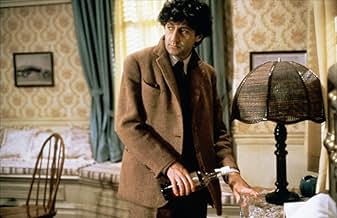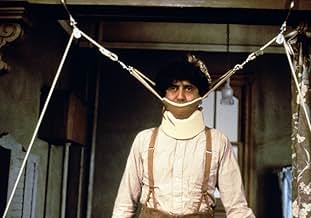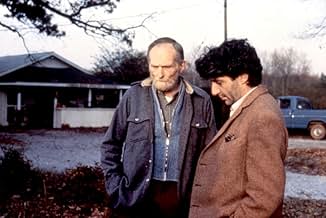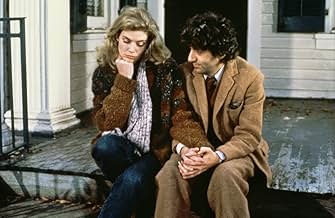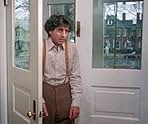IMDb रेटिंग
6.8/10
1.4 हज़ार
आपकी रेटिंग
अपनी भाषा में प्लॉट जोड़ेंA drunken Scottish poet who has not written a word in years feels compelled to regain control of his life and work after meeting a beautiful young woman.A drunken Scottish poet who has not written a word in years feels compelled to regain control of his life and work after meeting a beautiful young woman.A drunken Scottish poet who has not written a word in years feels compelled to regain control of his life and work after meeting a beautiful young woman.
- निर्देशक
- लेखक
- स्टार
- 2 ऑस्कर के लिए नामांकित
- 2 जीत और कुल 8 नामांकन
Thomas McGowan
- TV Interviewer
- (as Tom McGowan)
फ़ीचर्ड समीक्षाएं
This movie wasn't just written by Julius Epstein - as executive producer, and with another Epstein co-producing, he clearly midwifed it as well. So this would be a fairly unmediated labour of love from the man who penned Casablanca 40 years earlier, and damn if I don't like it better than Casablanca - if there's one thing I wanted to see it's a portrait of the lapsed poet as an old womanizing souse. Making him a Scot run amuck in New England is another great touch, gives the milieu a specificity you don't see every day. And that's not mentioning Tom Conti's very specific, and brilliant, performance - no wonder he never did anything comparable, he LIVES inside this thing. His hilarious portrayal of the sad-eyed loser Epstein has written him is the opposite of maudlin. As his doomed infatuation with young 'un Kelly McGillis approaches its inevitable demise, you wonder how on earth they are going to wrap things up - redemption would be corny, but despair would be hopeless and wrong. The answer he comes up with is a head-spinner, but it's also a perfect answer to this dilemma, and answers your lingering questions about the movie's name.
10barfly99
On paper, a comic fable about a randy, drunken, fading poet sounds like a recipe for disaster, but to the enormous credit of all involved, this film works very well indeed. Obviously a strong central performance is essential in films like this, and Tom Conti provides just that as the bedraggled Scottish writer charming his way into the beds of frustrated New England wives. Although the screenplay is consistently witty from start to finish, it is mainly in the second half of the film that it is also extremely moving. The romance between Conti and Kelly McGillis's young student is as obviously doomed as that of Romeo and Juliet, but just as heartbreaking too. The denouement is as sad and shocking as any in cinematic history, yet this film with its warmth and beauty and insight will surely light a fire in even the coldest of hearts.
This film is probably best known for having launched the screen career of Kelly McGillis, who charmingly and winsomely plays the young female lead in this story, a character whose name is Geneva (she is not Swiss but lives in New England, nor is she a banker). The lead role in this film is played by British actor Tom Conti, who had 24 years of film experience behind him already by this time. He still at this stage had an amazing head of curly hair, like a little boy. Conti has always been a consummate actor, as he proved so spectacularly to a mesmerised British public when he appeared in the remarkable TV series THE GLITTERING PRIZES in 1976, when he became for some time a kind of national cuddly icon. Conti does not play someone called Reuben. Reuben is the name of Kelly McGillis's dog (the real dog's name was Jamie), who plays a crucial role in the film at the ending, which I cannot reveal because of IMDb rules. Conti gives ones of his typically brilliant performances here, albeit of a highly unsympathetic character. He is a serial seducer of women and when he meets McGillis and falls in love for the first time, his habit of non-commitment means that he misses the chance of marrying the girl of his dreams because marrying is just not the sort of thing he wants to do again (having messed up a marriage with a very nice woman the first time round). Conti plays a famous British poet on a lecture and poetry-reading tour of New England, and remember that this is the 1980s when people could still become famous for being poets and they could actually travel round being admired, and rooms full of adoring American women would swoon over them. Conti has insufferable affectations, such as leaving a huge silk pocket handkerchief hanging perilously out of his tweed jacket breast pocket by as much as a foot in length, trailing in the breeze. It is meant to be 'a touch of the poet'. Nobody laughs at his handkerchief, and everybody takes him terribly seriously. He is brilliantly witty and a master of words, entrancing people with his word-play, ironic jokes, endless witticisms, and dazzling verbosity. There is one amazing scene where Conti is persuaded to go to church by Geneva (no, she is not a Calvinist either, but an Episcopalian). He goes up to the altar rail with his hands in his pockets, kneels down, and when the priest comes to him with the host and says: 'The body of Christ', Conti says: 'No thank you, I'm on a diet.' Everything for Conti is an excuse for a joke. The only thing he takes seriously is himself, being hopelessly narcissistic and hence all empty inside. This film is 'kind of a downer', even though it is extraordinarily funny and has an excellent script full of non-stop wit and irony by Julius Epstein and Herman Shumlin, based on a Peter de Vries novel. As a portrait of this type of narcissistic intellectual individual, it is an excellent film, exposing the hollowness of excessive self-love with merciless honesty. It is extremely well directed by Robert Ellis Miller, whose best film in my opinion was the emotionally devastating THE HEART IS A LONELY HUNTER (1968), which was one of the outstanding films of the 1960s and introduced Sondra Locke as a teenager. It should be mentioned that Tom Conti's performance here was so highly regarded when the film came out that he was nominated for an Oscar for Best Actor, and he well deserved that recognition.
If you are not familiar with movie history, then you do not know that thousands of films have been lost over time, from the silent era onwards. And many of these movies were landmarks, because they so perfectly captured a unique time or place, or because of technical achievements or great acting. Some lost movies were even blockbusters in their time but then began to seem dated and were quickly forgotten. Reuben, Reuben is an example of a relatively modern movie that is getting that age old treatment.
Tom Conti gives a brilliant performance in this movie, and the supporting cast is great. The screenplay and direction are brilliant. And the subject matter is meaty, something adults can think on and discuss seriously. So, why is this movie virtually unheard of now?
Reuben, Reuben is of its time - the early eighties - just before excessive style, slickness, and silly 50s-style moralism and hokeyness took hold. A number of brilliant movies were release in 1983 alone - Educating Rita, Local Hero, The Big Chill, Terms of Endearment. This was a period when story telling was paramount, and movies unfolded gently, with a respect for both real and theatrical time.
I have come to believe that many of these great movies are slowly being forgotten on some conscious level; we the viewing public does not want to remember the best, as it will make us realize the amount of dreck that is now released, and make us maudlin and mournful. This pleases the movie industry no end - it would prefer to have us come back again and again for sugary confections rather than supply us with something nutritious into which we can sink our teeth.
Hopefully, the Internet and sites like IMDb will help to promote near-forgotten gems like Reuben, Reuben, encouraging young movie fans to seek them out and then spread the word of their excellence. And, possibly, with growing recognition of really good cinema, the movie industry will not be so careless and neglectful.
Tom Conti gives a brilliant performance in this movie, and the supporting cast is great. The screenplay and direction are brilliant. And the subject matter is meaty, something adults can think on and discuss seriously. So, why is this movie virtually unheard of now?
Reuben, Reuben is of its time - the early eighties - just before excessive style, slickness, and silly 50s-style moralism and hokeyness took hold. A number of brilliant movies were release in 1983 alone - Educating Rita, Local Hero, The Big Chill, Terms of Endearment. This was a period when story telling was paramount, and movies unfolded gently, with a respect for both real and theatrical time.
I have come to believe that many of these great movies are slowly being forgotten on some conscious level; we the viewing public does not want to remember the best, as it will make us realize the amount of dreck that is now released, and make us maudlin and mournful. This pleases the movie industry no end - it would prefer to have us come back again and again for sugary confections rather than supply us with something nutritious into which we can sink our teeth.
Hopefully, the Internet and sites like IMDb will help to promote near-forgotten gems like Reuben, Reuben, encouraging young movie fans to seek them out and then spread the word of their excellence. And, possibly, with growing recognition of really good cinema, the movie industry will not be so careless and neglectful.
Reuben, Reuben! Tom Conti is Gowan McGland - a drunk, burnt-out has-been poet who's been slowly drinking himself to death. So why, as one of his acquaintances asks, does he get to "bed" 'so many women? What do they find so attractive? He's a charmer and a poet. Need we say more. As they said in "Dead Poets Society," why was poetry created - to woo women, of course. As the movie opens, we see him giving a reading of his work to a group of women. Some of them obviously piqued by his naughty little self and the way he scrutinizes himself and others under a microscope to find what really makes us tick and what turns us on, on all levels. He uses this theme of an awakening of self in his work, an arousal of all senses. The film centers on him trying to write and at the same time finding women to.... Enter Kelly McGillis who sees him on a train unable to pay his ticket, so she offers to pay and then bumps into him again later in the little Massachusetts town. Gowan tries to find semblance of order of his life, when he's told by an ex that she's writing a book about her marriage to him and he dictates some feelings into a tape recorder for her use. There's not any real action, but there's plenty of stimulation, great acting by Tom Conti, and extraordinarily insightful writing in this film. I was very impressed with screenwriter Epstein's script. The thoughts and ideas and feelings here were told in such a way as to be clear and simple, while they are representative of deep, multi-layered people and their mores. Epstein has the talent to be succinct. No other film has touched me or made such a profound impact on me, since I discovered "Ordinary People." The ending is a bit abrupt and almost unexpected, almost. But, when I see it again, I'm sure it will seem like it flows together. Everything was thoughtful and deliberate and those who love film like that will fall in love with Reuben, Reuben. But, wait, his character is Gowan McGland. So who or what is Reuben? What does it mean? What DOES it mean?
क्या आपको पता है
- ट्रिवियाThe Gowan McGland main character in this film and its source, Peter De Vries's 'Reuben, Reuben" novel, was predominantly based on Welsh poet Dylan Thomas. The picture was first released about 30 years after Thomas had passed away in 1953.
- भाव
Gowan McGland: Deprived of their support, her breasts dropped like hanged men.
- कनेक्शनFeatured in At the Movies: Broadway Danny Rose/Reckless/The Dresser/Reuben Reuben (1984)
टॉप पसंद
रेटिंग देने के लिए साइन-इन करें और वैयक्तिकृत सुझावों के लिए वॉचलिस्ट करें
- How long is Reuben, Reuben?Alexa द्वारा संचालित
विवरण
बॉक्स ऑफ़िस
- बजट
- $35,00,000(अनुमानित)
इस पेज में योगदान दें
किसी बदलाव का सुझाव दें या अनुपलब्ध कॉन्टेंट जोड़ें



